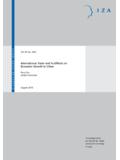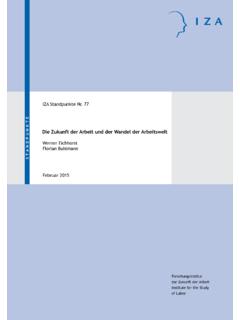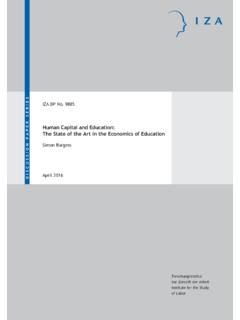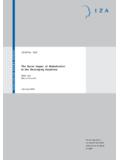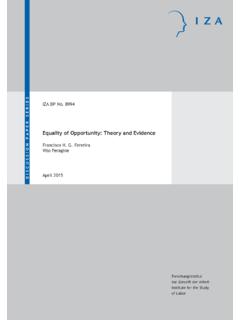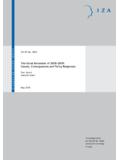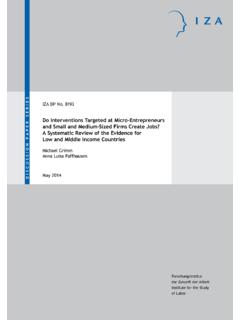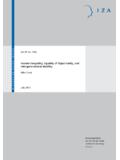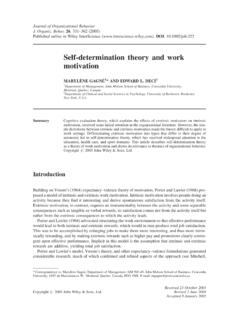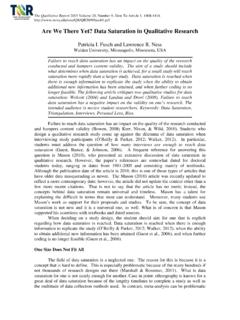Transcription of Why Do Individuals Choose Self-Employment?
1 IZA DP No. 3974 Why Do Individuals Choose Self-Employment? Christopher DawsonAndrew HenleyPaul LatreilleDISCUSSION PAPER SERIESF orschungsinstitutzur Zukunft der ArbeitInstitute for the Studyof LaborJanuary 2009 Why Do Individuals Choose self - employment ? Christopher Dawson Swansea University Andrew Henley Swansea University and IZA Paul Latreille Swansea University Discussion Paper No. 3974 January 2009 IZA Box 7240 53072 Bonn Germany Phone: +49-228-3894-0 Fax: +49-228-3894-180 E-mail: Any opinions expressed here are those of the author(s) and not those of IZA. Research published in this series may include views on policy, but the institute itself takes no institutional policy positions. The Institute for the Study of Labor (IZA) in Bonn is a local and virtual international research center and a place of communication between science, politics and business. IZA is an independent nonprofit organization supported by Deutsche Post Foundation.
2 The center is associated with the University of Bonn and offers a stimulating research environment through its international network, workshops and conferences, data service, project support, research visits and doctoral program. IZA engages in (i) original and internationally competitive research in all fields of labor economics, (ii) development of policy concepts, and (iii) dissemination of research results and concepts to the interested public. IZA Discussion Papers often represent preliminary work and are circulated to encourage discussion. Citation of such a paper should account for its provisional character. A revised version may be available directly from the author. IZA Discussion Paper No. 3974 January 2009 ABSTRACT Why Do Individuals Choose self - employment ?* This paper undertakes an analysis of the motivating factors cited by the self -employed in the UK as reasons for choosing self - employment . Very limited previous research has addressed the question of why Individuals report that they have chosen self - employment .
3 Two questions are addressed using large scale labour force survey data for the UK. The first concerns the extent to which the self -employed are self -employed out of necessity, opportunity, lifestyle decision or occupational choice. The second concerns the extent to which there is heterogeneity amongst the self -employed on the basis of the motivations that they report for choosing self - employment . Factor analysis reveals a number of different dimensions of entrepreneurship on the basis of stated motivation, but with no evidence that being forced into entrepreneurship through economic necessity is a significant factor. Motivation towards entrepreneurship is therefore highly multidimensional. Multivariate regression analysis is employed using a method to control for self -selection into self - employment . This reveals significant differences between men and women, with women concerned more with lifestyle factors and less with financial gain.
4 Market-directed opportunity entrepreneurship is more strongly associated with higher educational attainment. Those joining family businesses appear not to value prior educational attainment. Public policy to promote entrepreneurship therefore needs to be tailored carefully to different groups. JEL Classification: L26, J24 Keywords: self - employment , entrepreneurship, motivation, occupational choice Corresponding author: Andrew Henley School of Business and Economics Swansea University Singleton Park Swansea, SA2 8PP United Kingdom E-mail: * Dawson s contribution to this work was funded through a research studentship from the UK Economic and Social Research Council in association with the Welsh Assembly Government. 1. Introduction self - employment is a form of labour market status which may encompass a wide range of different activity. Individuals may Choose to be self -employed for many different reasons, and as a result the self -employed as a group may be highly heterogeneous.
5 At one end of a possible spectrum the self -employed may be identified as entrepreneurial, single employee micro-businesses. A substantial body of research investigates the self -employed as entrepreneurs, using self - employment as an observable category which, albeit imperfectly, identifies the stock of entrepreneurial talent in the economy. At the other end this spectrum, self - employment may comprise a far less desirable state chosen reluctantly by Individuals unable to find appropriate paid employment under current labour market conditions. So, for example, Individuals wanting flexible working hours might Choose self - employment if a paid employment contract offering sufficient flexibility is unavailable. For some self - employment may be chosen as the only available alternative to unemployment. Indeed in many developing economies self - employment may be viewed as a form of informal sector employment activity. To gain an understanding of the positive reasons why Individuals might Choose to become self -employed in order to venture a new business, a range of underlying motivations might be considered.
6 These might include, for example, the need for self -expression, for independence, for status, or for pecuniary advantage. An extensive literature has addressed the process of the formation of entrepreneurial intention (Krueger et al., 2000). Empirical analysis typically develops a range of constructs related to the formation of entrepreneurial intention by using detailed questionnaires with samples of Individuals and correlating these with reported strength of feeling about self - employment or entrepreneurship. In such studies 1 reported levels of interest in entrepreneurship are often very high, particularly if questions are framed loosely in terms of open-ended career aspirations (see Blanchflower et al, 2001). Such high levels are difficult to square with much lower levels of actual self - employment in many countries. This suggests that intentions to become self -employed are either frustrated or that self -reported aspirations are vague and poorly formed.
7 A further literature in economics models the choice of self - employment as an occupational choice decision, focusing on the importance of background and demographic associations. A key objective of this literature, taking its lead from the seminal study of Rees and Shah (1986), is to address whether the choice of self - employment might be motivated by the expected income differential between self - employment and employment for a given individual (see Le, 1999 and Parker, 2004, for surveys). Very little, if any, research has addressed the question of why those who have actually chosen self - employment , made that choice. The preceding discussion suggested that the self -employed can be classified into two broad types; those that have entered voluntarily for reasons such as independence, job satisfaction and or anticipated higher incomes, and those that have been pushed into self -employed because of the absence of any other attractive alternative.
8 If the motivations behind the decision to become self -employed are largely the former then self - employment can be viewed positively, providing the opportunity for Individuals to improve their quality of life and/or for exploring creative entrepreneurial opportunities. Public policy which supports transitions into self - employment may therefore have wider economic and societal benefits. On the other hand, if a substantial number are in self - employment for negative reasons then approaches to public policy which frame self - employment in entrepreneurial terms may unwittingly encourage some to launch business ventures for which they are ill-prepared and poorly resourced. Resulting spells of self - 2 employment may be short and disheartening, and in some cases may simply result in delayed transition into unemployment. In this paper we undertake an analysis of the motivating factors cited by the self -employed in the UK as reasons for choosing self - employment over the alternative of paid employment working for someone else.
9 This is undertaken by analyzing information contained within selected years of the UK Labour Force Survey, the main quarterly British household survey of labour market activity. The principal contribution of the paper is to provide a multivariate analysis of the association of a range of demographic and background characteristics with differing motivations for choosing self - employment , whilst controlling for the selection bias that arises because the self -employed as a group are unlikely to be representative of the whole population of the economically active. Specifically then we are concerned with two questions. The first concerns the extent to which the self -employed are self -employed out of necessity, opportunity, lifestyle decision or occupational choice. The second concerns the extent to which there is heterogeneity amongst the self -employed on the basis of the motivations that they report for choosing self - employment .
10 A factor analysis finds the existence of a number of different dimensions of entrepreneurship on the basis of stated motivation. We conclude that there are significant differences between different types within the self -employed in terms of gender, ethnicity, educational attainment and housing tenure status. The remainder of the paper is structured as follows. Section 2 provides further background and reviews previous related literatures. Section 3 describes the data source used. Section 4 discusses the methodology chosen to model self - employment motivation. Section 5 describes the results of the analysis. Section 6 provides a concluding discussion. 3 2. Background and Previous Literature Entrepreneurship, as a topic for research, has grown dramatically in recent years primarily due to the relationship thought to exist between entrepreneurial activity and economic development. New firms are thought to create new employment opportunities (Parker and Johnson 1996, Ashcroft and Love 1996).
